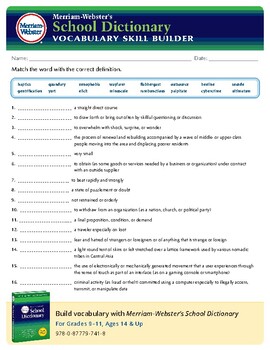- Merriam Webster Dictionary Serial Keyboard
- Merriam-webster Dictionary Citation
- Merriam Webster Dictionary Serial Key Generator
- Merriam Webster Dictionary Serial Keyword
Noah Webster, the founder of Merriam Webster, learned 26 languages in order to evaluate the etymology of words
Merriam Webster Dictionary Serial Keyboard

Merriam-Webster, Inc., which was originally the G & C Merriam Company of Springfield Massachusetts, is an American company that publishes reference books, especially dictionaries that are descendants of Noah Webster’s An American Dictionary of the English Language (1828).

Merriam-Webster, Inc. has been a subsidiary of Encyclopædia Britannica, Inc. since 1964
Merriam-webster Dictionary Citation
No other dictionary matches M-W's accuracy and scholarship in defining word meanings. Our pronunciation help, synonyms, usage and grammar tips set the standard. Go beyond dictionary lookups with Word of the Day, facts and observations on language, lookup trends, and wordplay from the editors at Merriam-Webster Dictionary. Jun 08, 2021 Central casting definition is - the department of a movie studio responsible for casting actors especially viewed as a source of people who are stereotypical of their role in appearance, behavior, or nature.
Merriam Webster Dictionary Serial Key Generator
In 1806, Noah Webster published his first dictionary, A Compendious Dictionary of the English Language. In 1807 Webster started two decades of intensive work to expand his publication into a fully comprehensive dictionary, An American Dictionary of the English Language. In order to evaluate the etymology of words, Webster learned 26 languages, including Old English (Anglo-Saxon), Gothic, German, Greek, Latin, Italian, Spanish, French, Dutch, Welsh, Russian, Hebrew, Aramaic, Persian, Arabic, and Sanskrit. Webster hoped to standardize American speech, since Americans in different parts of the country used somewhat different vocabularies and spelled, pronounced, and used words differently.
Merriam Webster Dictionary Serial Keyword
Noah Webster
Webster completed his dictionary during his year abroad in 1825 in Paris, and at the University of Cambridge. His 1820s book contained 70,000 words, of which about 12,000 had never appeared in a dictionary before. As a spelling reformer, Webster believed that English spelling rules were unnecessarily complex, so his dictionary introduced American English spellings, replacing “colour” with “color”, “waggon” with “wagon”, and “centre” with “center”. He also added American words, including “skunk” and “squash”, that did not appear in British dictionaries. At the age of 70 in 1828, Webster published his dictionary; it sold well with 2,500 copies. In 1840, the second edition was published in two volumes.
Austin (2005) explores the intersection of lexicographical and poetic practices in American literature, and attempts to map out a “lexical poetics” using Webster’s dictionaries as a base. He shows the ways in which American poetry has inherited Webster ideas and has drawn upon his lexicography in order to develop the language. Austin explicates key definitions from both the Compendious (1806) and American (1828) dictionaries, and brings into its discourse a range of concerns, including the politics of American English, the question of national identity and culture in the early moments of American independence, and the poetics of citation and of definition. Webster’s dictionaries were a redefinition of Americanism within the context of an emergent and unstable American sociopolitical and cultural identity. Webster’s identification of his project as a “federal language” shows his competing impulses towards regularity and innovation in historical terms. Perhaps the contradictions of Webster’s project comprised part of a larger dialectical play between liberty and order within Revolutionary and post-Revolutionary political debates.